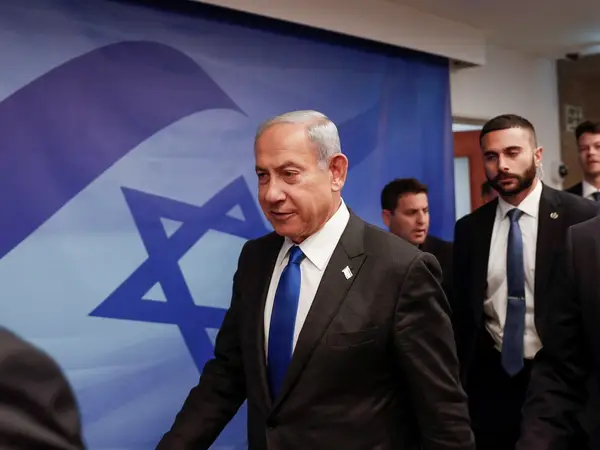The “most hawkish” security cabinet Israel has known was announced Tuesday as Benjamin Netanyahu promised a new strategy against Iran.
At the first meeting of the wider, 31-person cabinet, Netanyahu said he would “work more vigorously to prevent Iranian-military entrenchment in Syria and elsewhere” and that he would step up opposition to efforts to revive the 2015 Iran nuclear agreement, the JCPOA (Joint Comprehensive Plan of Action).
Some Israeli media play up a warm relationship between Netanyahu and United States President Biden, arguing the Israeli prime minister has little to fear over JCPOA revival. Israel Hayom, the free Israeli newspaper owned by the family of US Republican Party ‘kingmaker’ Sheldon Adelson, claimed Antony Blinken, the US Secretary of State, told new Israeli Foreign Minister Eli Cohen in a 40-minute phone-call that the JCPOA was finished, and that the US wanted the European Union to step up sanctions against Iran.
A leading member of the 11-member security cabinet – Itamar Ben Gvir, the national security minister and leader of Otzma Yehudi (Jewish Power) – earlier in the day visited the Temple Mount, sparking memories of the September 2000 visit by Ariel Sharon that led to the so-called second Palestinian intifada. The site, which contains both the temple and the al-Aqsa Mosque, has been occupied by Israel since the 1967 war.
European Union foreign policy chief continued efforts in December over the JCPOA, meeting Iranian foreign minister Hossein Amir-Abdollahian in Jordan, and the EU now faces a quandary heightened by several European countries sanctioning Iran over its dealing with current unrest or military links with Russia.
US ‘maximum pressure’ sanctions on Iran were introduced in 2018 when former President Donald outlined a range of demands of Iran, including ending any uranium enrichment and stopping support for militant proxy groups. But while the sanctions badly affected Iran’s economy, Tehran rejected the US demands and has increased its nuclear program beyond JCPOA limits.
‘The sphere of global opinion’
While Europe welcomed Biden’s commitment, on taking office in 2021, to restore the JCPOA, neither multilateral talks with world powers nor bilateral US-Iran contacts have bridged gaps. While Biden has continued the sanctions ostensibly to secure JCPOA revival, it emerged in December that he had in November described the JCPOA as “dead.”
While the latest Israeli military intelligence report favors efforts to reach an international agreement over Tehran’s nuclear program, Netanyahu, who has argued since the 1990s that Iran was close to acquiring a nuclear weapon, told the cabinet Tuesday that Israel would work not only “with leaders behind closed doors but strongly and openly in the sphere of global opinion” to prevent the remaining “possibility” that the JCPOA could be revived. “Global opinion” was “now aware of the true dangers posed by Iran – the Iranian regime that is killing innocent citizens in and outside Iran,” he said.
The Times of Israel reported that even if Likud Party members on the security cabinet “watered down” the influence of Gvir and Bezalel Smotrich, leader of the Religious Zionism Party, this was still “among the most hawkish the country has ever known, reflecting the radical-right makeup of the new government.” During his Knesset tenure Ben Gvir set up an office in Sheikh Jarrah quarter, Jerusalem, where Palestinian Christians are resisting eviction, and has called on Israeli police to open fire on protestors.
While media attention in Israel is focused on Netanyahu’s plans for judicial reform or his promise of a broad front against Iran, Palestinian parties are concerned that the new government will speed up and extend Jewish settlements in the West Bank. United Nations experts in December condemned “rampant Israeli settler violence and excessive use of force by Israeli forces,” and the UN General Assembly last Friday voted to seek an opinion from the International Court of Justice (ICJ), the UN’s highest court, on Israeli occupation of Palestinian land.
